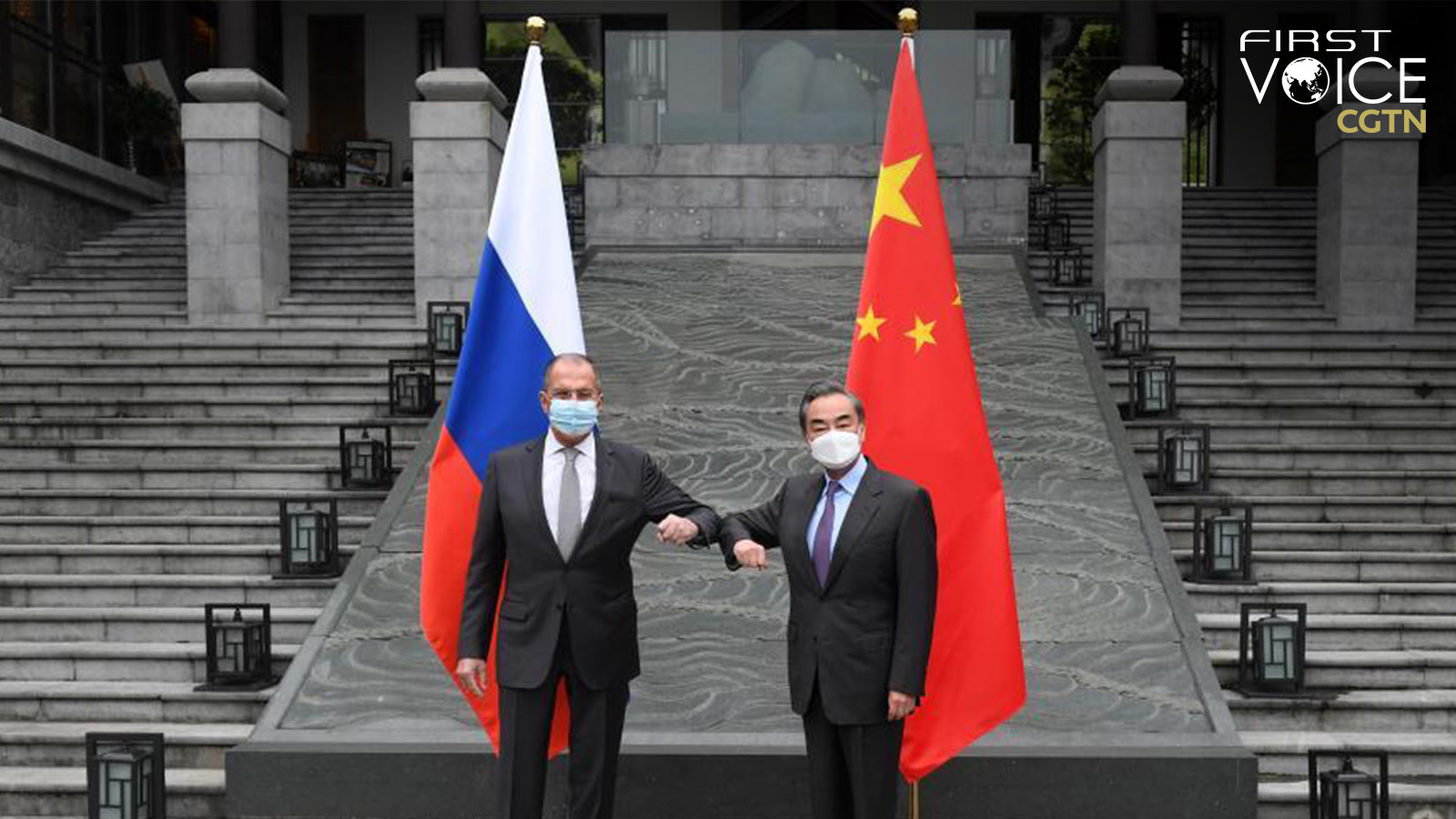
Editor's note: CGTN's First Voice provides instant commentary on breaking stories. The daily column clarifies emerging issues and better defines the news agenda, offering a Chinese perspective on the latest global events.
Russian Foreign Minister Sergei Lavrov's visit to the picturesque Guilin in southern China was marked by an acknowledgment that both Moscow and Beijing share an indomitable relationship devoid of the hegemonic designs or transactional bargaining that has defined the American approach towards both countries. His meeting with Chinese counterpart Wang Yi illustrates how both countries weathered unwarranted Western interference in their domestic affairs and the myopic strategic planning from Washington D.C.
Earlier this month, U.S. President Joe Biden called the Russian President Vladimir Putin a "killer," severely undermining the possibility of a rapprochement between Russia and the U.S., given the crass personal reference made is unbecoming of a statesman. Then came the prolonged criticism of China from a perceived position of strength in Anchorage, Alaska despite Beijing's call for peace based on mutual respect for state sovereignty.
The strategic wisdom underpinning this visit should not be construed as an attempt to ward off Western criticism but serves as a reminder that sovereign states would adopt an uncompromising stance on their territorial sovereignty and security. Foreign Ministry spokesperson Hua Chunying pointed out that China and Russia are not ganging up against the United States but simply tempering Washington's expectation of being the sole arbiter in global affairs.
China and Russia have been repeatedly labelled as the trouble-makers and provocateurs by the U.S. It has imposed sanctions or ripped up treaties at its own wish based on its biased judgement of the situation. The United States cannot be counted as a reliable partner. Lavrov's push for reducing reliance on the U.S. dollar comes from the fact that Western payment systems are often utilized for ideological agendas.

A container is lifted by a gantry crane at Suifenhe Railway Port in Suifenhe, an important Chinese port for trade with Russia, northeast China's Heilongjiang Province, October 28, 2020. /Xinhua
A container is lifted by a gantry crane at Suifenhe Railway Port in Suifenhe, an important Chinese port for trade with Russia, northeast China's Heilongjiang Province, October 28, 2020. /Xinhua
Both sides should not be reprimanded for adopting such an attitude. The practice of imposing sanctions equivalent to economic coercion necessitates policies that can offset its pernicious impact. By underlining the deleterious effects of American policies, the meeting is a rebuttal to the U.S.' unilateral way of conducting policies that are defined by shortsighted and mercenary approaches against both countries despite the its overt commitment towards multilateralism.
Wang and Lavrov's meeting is not an attempt to forge an alliance to coerce or intimidate the United States, but a reminder as to where American policies have gone astray. The Biden administration needs to take a long hard look at the damage his administration and his predecessors have done to world peace and global security.
Ironically, the way that the meeting was conducted and issues addressed should have also been the defining feature of the dialogue between China and the U.S. Much of what was spoken about between Wang and Lavrov was based on a global view for peace.
References to abiding by the UN Charter for example, or upholding the true essence of multilateralism devoid of alliance building towards disruption and respecting countries which have different political systems, are globally accepted principles. Genuine concern has also been expressed over issues such as the Iran nuclear deal and the future of American engagement in it. But the U.S.' aggressive approach and its self-indulgent exceptionalism impeded how mature nations would've conducted their diplomacy in Anchorage.
The strength of the China-Russia relationship, epitomized by the foreign ministers' meeting in Guilin, not only demonstrates that American coercive policies and attempts at subjugation will not deter countries that share strong bonds from citing principles of coexistence on merit, but also stands the test of time. That is precisely how it should be.
Scriptwriter: Hamzah Rifaat Hussain
(If you want to contribute and have specific expertise, please contact us at opinions@cgtn.com.)

